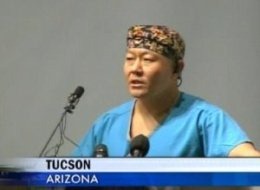Why Gabrielle Giffords’s Doc Is 100% Wrong
Dr. Peter Rhee, Chief of the Trauma Division at Tucson’s University Medical Center, makes me proud to be a University of Arizona alum. But he made a mistake in at least two interviews yesterday that spokespersons should be careful to avoid.
When asked about the prognosis for his patient, Rep. Gabrielle Giffords, he said:
“Well, I would say — you know, as a physician, I am going to get in a lot of trouble for this — but her prognosis for survival is 100 percent, as far as it being short term. I mean, hopefully she’ll live to be 95-years-old.”
Later, Dr. Rhee doubled down on those comments, telling McClatchy Newspapers: “She has a 101 percent chance of surviving…She will not die.”

I’m relatively healthy, but I’d be wary if my physician told me I had a “100 percent chance” of surviving the week. How does he know that? I’d be much more inclined to believe him if he told me my odds of surviving the week were “terrific,” “quite high,” or “close to 100 percent.”
I’m surprised Dr. Rhee would make such a declarative statement regarding a patient in critical condition, and would counsel my physician clients against doing the same. If his patient takes a turn for the worse, he has set himself up to answer difficult questions about why he was wrong – and the error could compromise his credibility for future stories.
The question of when – and whether – to use absolutes in media interviews (e.g. “never,” “always,” “absolutely,” “100 percent,” “perfect”) isn’t an easy one. On one hand, journalists love it when spokespersons utter absolute statements – they’re strong, action-oriented phrases that make for good copy. But the flip side is that they’re a bit of a gamble. If there’s any chance whatsoever that you’re wrong, they can come back to haunt you.
In general, I don’t have a problem using absolutes in media interviews, but the statements better be safe. For example, I doubt too many people would have a problem if the Pima County Sheriff had said, “This was definitely one of the worst crime scenes I’ve ever seen in my career.”
But declaring a critical patient to have exactly zero risk (or less than zero risk) seems to be a bit of a high-wire act – and I suspect Dr. Rhee already knows that, since he began his statement with the self-conscious words, “As a physician, I am going to get in a lot of trouble for this.”
The question of when it’s “safe” to use the language of absolutes is subjective, but here are a couple of tips to help guide you:
- It’s probably safe to use an absolute statement as part of a personal opinion (e.g. “My favorite dessert of all time is ice cream.”)
- It’s also probably safe when there is a large amount of demonstrable, seemingly irrefutable, evidence.
But something as uncertain as a critical patient’s likelihood of survival doesn’t seem to meet either of those thresholds.
My critique of Dr. Rhee’s interview is confined solely to his declaration of absolute certainty. In the interview clip above, he did a terrific job of explaining complicated medical procedures in everyday language and expressing genuine compassion for his patient.
Overall, he represented himself and my university quite well.



I think it’s safe to say that Dr. Rhee doesn’t suffer a lot of self-doubt. To me, he seems a bit arrogant. But if I want someone to be fixing me after I get a bullet in my brain, I want them to be utterly confident in their ability to save my life. I suspect you have to be self-confident in the extreme to do what he does.
Bob – That’s a fair point, and I agree with you. I tried to limit my critique to that one communications choice without knocking Dr. Rhee personally, since I think we all recognize the incredible, life-saving work he and his team performed.